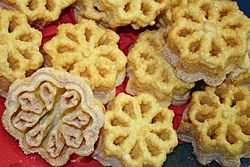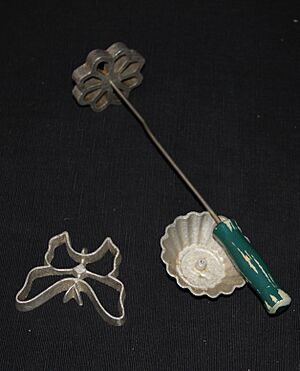Rosette (cookie) facts for kids

Sugared rosettes from a bakery
|
|
| Type | Fritter |
|---|---|
| Main ingredients | Batter (wheat flour, milk, sugar, salt, eggs) |
Rosette cookies are thin, crispy treats that are a bit like cookies or fritters. They are made using special iron molds and are popular in many countries around the world. The name rosettbakkels comes from Norway.
Rosettes are known for their beautiful, lacy patterns. People traditionally make them during Christmas time. These recipes are very popular in the United States, especially among families with Scandinavian backgrounds.
To make rosettes, you use special tools called rosette irons. These irons have fancy designs. The dough, called batter, is made from wheat flour, eggs, sugar, and milk.
First, the iron is heated in very hot oil. Then, it is dipped into the batter. Next, it goes back into the hot oil. This creates a crispy shell around the metal iron. After a short time, the iron is lifted out, and the rosette easily separates from it. People often dip the edges of rosettes in frosting or sugar for extra sweetness.
You can also make a Swedish dish called timbale using rosette batter. Instead of a rosette iron, you use a timbale mold. These can be filled with savory ingredients, like creamy chicken and mushrooms.
Contents
How to Make Rosette Cookies
Rosette cookies are made with a special kitchen tool called a rosette iron. This tool has a long handle and a metal shape at the end. Common shapes include stars, flowers, snowflakes, or Christmas trees.
Here's how it works:
- The metal part of the iron is heated in hot oil.
- Then, it is dipped into the cookie batter.
- The iron is returned to the hot oil.
- As the batter cooks, it gently detaches from the mold.
- The cookie is then flipped to finish cooking until it's golden and crispy.
Once cooked, rosettes are usually topped with sugar or honey. This way of making them was written down in a cookbook from the 19th century called Aşçı başı, which is about Ottoman cooking.
Where Rosette Cookies Are Popular
You can find different versions of this cookie in many places around the world. They are popular in northern Europe, Iran, and Turkey. In Sri Lanka, they are known as kokis.
Other Names for Rosette Cookies
This type of fritter has many different names in various cultures:
- In Sweden, they are called struvor.
- In Turkish, they are known as demir tatlisi.
- In Spain, they are called flores manchegas, which means "Manchegan flowers."
- In Iran, they are shirini panjerei (شیرینی پنجرهای).
- In Tunisian cuisine, they are called chebbak el-janna.
- In Afghanistan, they are known as kulcha-e-panjerei (window biscuits).
- In Bangladesh, they are called Fuljhuri pitha or Fulkuchi pitha.
- In South India, they are called "Gulabi" (గులాబీ పువ్వులు).
- In Kerala, India, they are known as achappam.
- In Tamil Nadu, India, they are called achumurukku.
- In Malaysia, they are called kuih Loyang.
- Among Anglo-Indian, East Indian, and Goan people, they are also called rose cookies.
See also
 In Spanish: Rosette (pastel) para niños
In Spanish: Rosette (pastel) para niños
 | James Van Der Zee |
 | Alma Thomas |
 | Ellis Wilson |
 | Margaret Taylor-Burroughs |


